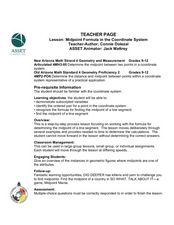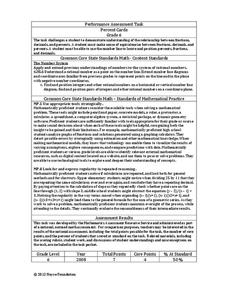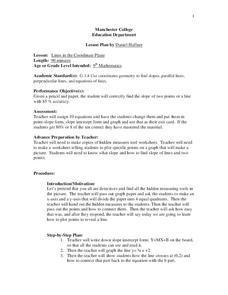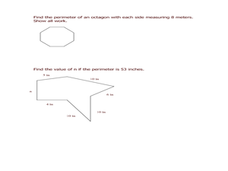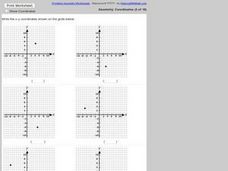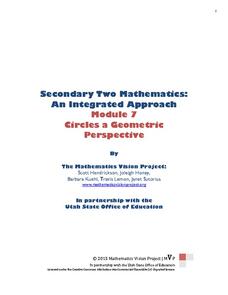CK-12 Foundation
Forms of Linear Equations: Equation Exploration
Different forms, same line. Young mathematicians investigate the standard form, slope-intercept form, and point-slope form of a linear equation. An interactive has them adjust lines on a coordinate plane to see changes in each form of...
Curated OER
Midpoint Formula in the Coordinate System
Students calculate the midpoint of a line. In this geometry activity, students identify the different parts of the coordinate plane. They use the midpoint formula to find the middle of segments between a pair of coordinates.
Curated OER
Pairs of Lines
In this geometry worksheet, students differentiate between perpendicular and parallel planes and lines. They identify segments that are parallel and perpendicular to sides. There are 22 questions.
Curated OER
Coordinate Connections
Sixth graders complete several activities that involve coordinates and graph paper. They visualize and identify geometric shapes after applying transformations on a coordinate plane. Finally, 6th graders draw and label a coordinate...
Curated OER
Motions In Geometry
In this motions in geometry worksheet, students draw translations, rotations, and reflections. This three-page worksheet contains examples, instructions, and 6 problems. The last page contains answers.
EngageNY
How Do Dilations Map Lines, Rays, and Circles?
Applying a learned technique to a new type of problem is an important skill in mathematics. The lesson asks scholars to apply their understanding to analyze dilations of different figures. They make conjectures and conclusions to...
Noyce Foundation
Percent Cards
Explore different representations of numbers. Scholars convert between fractions, decimals, and percents, and then use these conversions to plot the values on a horizontal number line.
EngageNY
Similarity
Use the coordinate plane to show two figures are similar. The lesson plan incorporates congruence transformations and dilations to move a figure on to another figure. Pupils determine that if a similarity transformation exists between...
Virginia Department of Education
Transformations
The coordinate plane is a popular place! Identify rotations, reflections, and dilations on the coordinate plane. Pupils work in small groups to match transformations of a figure with the description of the transformation. They perform...
Mathematics Assessment Project
Square
Don't be a square! Young mathematicians determine the slope and length of a line segment. They then prove whether four given coordinate points form a square.
Virginia Department of Education
Distance and Midpoint Formulas
Small groups work through two guided activities to derive the distance and midpoint formulas for the coordinate plane. The activities begin with concrete examples and move to abstract.
CK-12 Foundation
Evaluate Limits Using Graphs and Tables: Where Is That Limit?
Limits are made easy through graphs and tables. An easy-to-use interactive lets users change a function on a coordinate plane. They relate graphs and tables to the limit at a specific value.
Curated OER
5 Vector Geometry
Students imagine the way lines look. In this vector lesson, students recognize how to find a vector equation, Cartesian equation or perpendicular distance. Students find angles between planes. Students complete an activity with...
Curated OER
Lines in the Coordinate Plane
Students graph lines in a coordinate plane. In this geometry activity, students graph lines on a coordinate plane, and identify the slope. They classify the lines as parallel or perpendicular and write an equation of a given line.
Curated OER
Functions and the Vertical Line Test
Students examine functions and function notation. They use computer activities to discover how to graph functions, and conduct a vertical line test. Students describe spatial relationships using coordinate geometry.
Curated OER
Human Geometry Book
Students investigate geometric shapes. In this geometry lesson, students read the book The Greedy Triangle and define the shapes mentioned in the book. Students make the shapes by using their bodies.
Curated OER
Reflections in the Plane
Have your class explore the concept of reflections as they use Cabri Jr. to construct a triangle and reflect it over a line. Learners reflect shapes across the coordinate plane and across the lines y = x and y = -x.
Curated OER
Algebra/Geometry Institute Summer 2007 - Perimeter of Polygons
Sixth graders find the perimeters of polygons and use perimeters to form polygons. In this perimeter lesson, 6th graders study vocabulary associated with finding perimeter such as polygon, line segment, variable, and formula. They make...
Curated OER
Geometry Concepts and Applications
In this concepts and applications review worksheet, 10th graders solve and complete 40 various types of multiple choice problems. First, they write the equation of a vertical line passing through a point. Then, students find the...
Curated OER
Identifying Lines: Horizontal, Vertical, and Oblique
Second graders identify horizontal, vertical, and oblique lines on a worksheet after learning them in class. They demonstrate a horizontal line with their arms while saying the word and use their arms with no talking to demonstrate...
Curated OER
Identifying Points in the Coordinate Plane
In this ordered pairs instructional activity, learners identify 6 ordered pairs given a coordinate plane. Students list the ordered pair given the graph.
Curated OER
Measuring Angles & Segments
Young scholars view a PowerPoint for a warm-up lesson. They practice measuring around the classroom, measuring such things as the length and width of a desk, pencil, door, and book. Students use a website to practice measuring angles.
Mathematics Vision Project
Circles: A Geometric Perspective
Circles are the foundation of many geometric concepts and extensions - a point that is thoroughly driven home in this extensive unit. Fundamental properties of circles are investigated (including sector area, angle measure, and...
Inside Mathematics
Graphs (2006)
When told to describe a line, do your pupils list its color, length, and which side is high or low? Use a worksheet that engages scholars to properly label line graphs. It then requests two applied reasoning answers.



